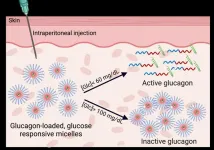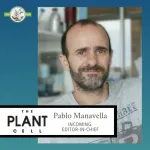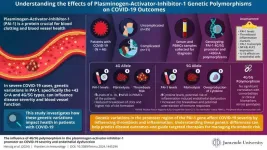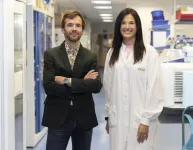(Press-News.org) CLEVELAND—Researchers at Case Western Reserve University and Vanderbilt University are pioneering a new approach to prostate cancer surgery by combining advanced robotics and “low-field” MRI technology.
The research aims to allow highly accurate, patient-tailored prostate cancer surgeries without the need for traditional incisions. This innovative research marks a major step in developing minimally invasive treatments for prostate cancer, with the potential to improve both safety and efficiency for patients.
The project is being funded by a new five-year, $3.7 million grant from the National Cancer Institute, part of the National Institutes of Health (NIH).
William Grissom, the Medtronic Professor of Biomedical Discovery and Innovation at the Case Western Reserve School of Medicine and Case School of Engineering, and Robert Webster, the Richard A. Schroeder Professor of Mechanical Engineering at Vanderbilt University, are leading the collaboration.
Together, they will work to adapt a robot from Virtuoso Surgical Inc. (a Vanderbilt startup company Webster founded) to remove prostate cancer lesions. They will integrate the robot with Promaxo Inc.’s low-field MRI scanner, which, unlike transrectal ultrasound, can image the prostate without blocking surgical access to the lesions.
“Our goal is to eliminate the many complications associated with whole-gland prostate removal to treat prostate cancer,” Grissom said. “Targeted removal of localized prostate lesions could alleviate these complications but is challenging because cancerous tissue can appear identical to healthy tissue in endoscopic images, making accurate surgery difficult.”
Webster added, “The new robot will be able to carefully guide surgical instruments directly to prostate cancer lesions identified in high-field MR images. This will enable surgeons to focus treatment on specific cancerous lesions.”
In addition to securing the NIH grant, Grissom was recently appointed the Case Western Reserve School of Medicine’s first Medtronic Professorship of Biomedical Discovery and Innovation for his transformative work in the field.
###
Case Western Reserve University is one of the country's leading private research institutions. Located in Cleveland, we offer a unique combination of forward-thinking educational opportunities in an inspiring cultural setting. Our leading-edge faculty engage in teaching and research in a collaborative, hands-on environment. Our nationally recognized programs include arts and sciences, dental medicine, engineering, law, management, medicine, nursing and social work. About 6,000 undergraduate and 6,300 graduate students comprise our student body. Visit case.edu to see how Case Western Reserve thinks beyond the possible.
Founded in 1873 as an institution that would “contribute to strengthening the ties that should exist between all sections of our common country,” Vanderbilt University is globally renowned for its transformative education and pathbreaking research. The university’s 10 schools reside on a parklike campus set in the heart of Nashville, Tennessee, contributing to a collaborative culture that empowers leaders of tomorrow and prizes free expression, open inquiry and civil discourse.
The Vanderbilt School of Engineering is internationally recognized for the superior quality of its inclusive research and education programs in numerous fields of engineering. The School prepares students to become leaders and innovators in addressing our grand societal challenges.
END
Case Western Reserve, Vanderbilt universities to develop incisionless prostate surgery using MRI and robotics
Awarded five-year, $3.7M grant from National Institutes of Health, National Cancer Institute
2024-10-02
ELSE PRESS RELEASES FROM THIS DATE:
Carnegie Mellon University secures ARPA-H award to improve adherence, lower cost of treatment for obesity and Type 2 diabetes patients
2024-10-02
PITTSBURGH – A Carnegie Mellon University-led team of researchers has secured an award of up to $34.9 million from the Advanced Research Projects Agency for Health (ARPA-H). The funds will fast track a bioelectronic implant that could radically improve treatment options and significantly reduce the cost of care for patients with obesity and Type 2 diabetes.
The award will drive the accelerated development and testing of “Rx On-site Generation Using Electronics (ROGUE),” a bioelectrical device that hosts a “living pharmacy,” consisting of engineered cells that produce biological therapy to treat Type 2 diabetes and obesity. The device will offer continuous, ...
A new injectable to prevent and treat hypoglycemia
2024-10-02
People with diabetes take insulin to lower high blood sugar. However, if glucose levels plunge too low — from taking too much insulin or not eating enough sugar — people can experience hypoglycemia, which can lead to dizziness, cognitive impairment, seizures or comas. To prevent and treat this condition, researchers in ACS Central Science report encapsulating the hormone glucagon. In mouse trials, the nanocapsules activated when blood sugar levels dropped dangerously low and quickly restored glucose levels.
Glucagon is a hormone that signals the liver to ...
Turning plants into workout supplement bio-factories
2024-10-02
It’s important to eat your veggies, but some essential vitamins and nutrients can only be found in animals, including certain amino acids and peptides. But, in a proof-of-concept study published in ACS’ Journal of Agricultural and Food Chemistry, researchers developed a method to produce creatine, carnosine and taurine — all animal-based nutrients and common workout supplements — right inside a plant. The system allows for different synthetic modules to be easily stacked together to boost production.
Plants can be surprisingly receptive when asked to produce compounds ...
Pablo Manavella appointed next Editor-In-Chief of The Plant Cell
2024-10-02
The American Society of Plant Biologists (ASPB) is excited to announce Pablo Manavella will serve as the next Editor-in-Chief of The Plant Cell. The Plant Cell is a leading international society journal that publishes novel research of special significance in plant biology, especially in the areas of cellular biology, molecular biology, biochemistry, genetics, development, and evolution.
Manavella is currently a Consejo Superior de Investigaciones Científicas (CSIC) researcher at the Institute for Mediterranean and Subtropical Horticulture (IHSM) in Málaga, Spain. He is the Principal Investigator in a lab focusing on the intricate mechanisms regulating ...
Unveiling genetic insights: how PAI-1 polymorphisms influence COVID-19 outcomes
2024-10-02
Despite global vaccination efforts, COVID-19 continues to pose significant risks, leading to severe complications and fatalities. These risks are driven by disrupted coagulation, impaired fibrinolysis, which is the process of breaking blood clots, and heightened inflammatory responses. The fibrinolytic system, crucial for maintaining balance within the coagulation cascade, relies on plasmin-mediated fibrin degradation. Plasminogen activators convert plasminogen into plasmin, an enzyme that breaks down ...
Redefining Publishing: PLOS receives multi-million-dollar grant funding for new research initiative
2024-10-02
SAN FRANCISCO —PLOS today announced that it has received a $1.5 million grant from the Robert Wood Johnson Foundation and a $1 million grant from the Gordon and Betty Moore Foundation to support our mission to drive Open Science forward with meaningful change in scholarly publishing. The funds enable PLOS to embark on an ambitious 18-month research and design project to explore how to tackle two barriers that exclude many researchers from meaningfully participating in Open Science: affordability ...
Planning a drug’s route in the body with synthetic chemistry
2024-10-02
Researchers at the RIKEN Cluster for Pioneering Research (CPR) have developed technology that can alter, within the body, the recognized identity of proteins. The innovation, published in Nature Communications on October 2, allowed researchers to target mouse tumors with a protein and then transport that protein out of the body. This means that cancer-killing drugs could be sent directly to tumors and then excreted from the body after dropping off their payload. The technology also has the potential to allow multi-purpose drugs that can travel from organ to organ, performing ...
Smoke from megafires puts orchard trees at risk
2024-10-02
Smoke From Megafires Puts Orchard Trees at Risk
Effects Last Months, Reducing Nut Crop Yields
By Amy Quinton | October 2, 2023
Long-term smoke exposure from massive wildfires lowers the energy reserves of orchard trees and can cut their nut production by half, researchers at the University of California, Davis, found. The smoke can affect trees for months after a megafire, depressing their bloom and the next season’s harvest. This finding reveals a new danger from wildfires that could affect plant health in both agricultural and natural environments.
Nature Plants published ...
Health Data Research UK and National Research Foundation Singapore formalize landmark partnership in health data science
2024-10-02
Health Data Research UK (HDR UK) and the National Research Foundation Singapore (NRF) are pleased to have signed a Memorandum of Understanding (MoU) today, that formalises a collaborative partnership in healthcare and data science. The partnership will leverage cutting-edge data science and research, with a focus on trustworthy data use to power improvements in healthcare, research and innovation, strengthening existing links between the UK and Singapore.
The MoU was signed by Permanent Secretary for National Research and ...
CNIO researchers propose a new treatment for brain metastasis based on immunotherapy
2024-10-02
CNIO researchers have discovered that cancer perverts certain brain cells, the astrocytes, and causes them to produce a protein that works in favour of the tumour.
A drug, silibinin, inhibits this protein, and could be used to help treat brain metastasis with immunotherapy. A clinical trial is underway.
The work is published in the American Association for Cancer Research's journal Cancer Discovery.
Researchers at the Spanish National Cancer Research Centre (CNIO) propose a new treatment for brain metastases that respond poorly, or not at all, to immunotherapy, and provide a biomarker to predict ...
LAST 30 PRESS RELEASES:
Women may face heart attack risk with a lower plaque level than men
Proximity to nuclear power plants associated with increased cancer mortality
Women’s risk of major cardiac events emerges at lower coronary plaque burden compared to men
Peatland lakes in the Congo Basin release carbon that is thousands of years old
Breadcrumbs lead to fossil free production of everyday goods
New computation method for climate extremes: Researchers at the University of Graz reveal tenfold increase of heat over Europe
Does mental health affect mortality risk in adults with cancer?
EANM launches new award to accelerate alpha radioligand therapy research
Globe-trotting ancient ‘sea-salamander’ fossils rediscovered from Australia’s dawn of the Age of Dinosaurs
Roadmap for Europe’s biodiversity monitoring system
Novel camel antimicrobial peptides show promise against drug-resistant bacteria
Scientists discover why we know when to stop scratching an itch
A hidden reason inner ear cells die – and what it means for preventing hearing loss
Researchers discover how tuberculosis bacteria use a “stealth” mechanism to evade the immune system
New microscopy technique lets scientists see cells in unprecedented detail and color
Sometimes less is more: Scientists rethink how to pack medicine into tiny delivery capsules
Scientists build low-cost microscope to study living cells in zero gravity
The Biophysical Journal names Denis V. Titov the 2025 Paper of the Year-Early Career Investigator awardee
Scientists show how your body senses cold—and why menthol feels cool
Scientists deliver new molecule for getting DNA into cells
Study reveals insights about brain regions linked to OCD, informing potential treatments
Does ocean saltiness influence El Niño?
2026 Young Investigators: ONR celebrates new talent tackling warfighter challenges
Genetics help explain who gets the ‘telltale tingle’ from music, art and literature
Many Americans misunderstand medical aid in dying laws
Researchers publish landmark infectious disease study in ‘Science’
New NSF award supports innovative role-playing game approach to strengthening research security in academia
Kumar named to ACMA Emerging Leaders Program for 2026
AI language models could transform aquatic environmental risk assessment
New isotope tools reveal hidden pathways reshaping the global nitrogen cycle
[Press-News.org] Case Western Reserve, Vanderbilt universities to develop incisionless prostate surgery using MRI and roboticsAwarded five-year, $3.7M grant from National Institutes of Health, National Cancer Institute





